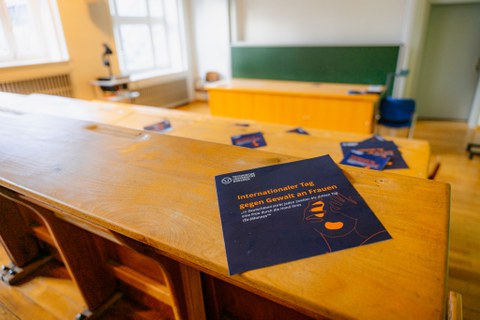Nov 01, 2023
Engagement against violence against women: Registration started
Since 2021, TU Dresden has been participating in the European research project UniSAFE, which examines the phenomenon of gender-based violence in science and research with the help of 46 participating universities and research institutions in 15 countries in Europe.
With over 42,000 responses from staff and students, the related digital survey is the largest ever conducted in the European Research Area. It highlighted:
EARLY 2 IN 3 RESPONDENTS HAVE EXPERIENCED GENDER-BASED VIOLENCE1
ALMOST 1 IN 3 RESPONDENTS HAVE EXPERIENCED SEXUAL HARASSMENT2
LOW REPORTING OF GENDER-BASED VIOLENCE INCIDENTS3
In the context of this year's programme for the International Day against Violence against Women on 25 November the TUD-specific results of the UniSAFE study will be compared and classified with the above-mentioned results for the first time during a lunchtalk.

Rector Staudinger and Vice-Rector Kobel stand in front of the rectorate illuminated in orange. By doing so, the rectorate joins Orange the Day to raise awareness of violence against women.
Since 2021, TU Dresden has been using the day to draw attention to gender-based violence through awareness-raising and empowerment formats. At that time, it participated in the "Orange the World" campaign for the first time and had the rectorate illuminated in orange.
Programme for the International Day against Violence against Women or Gender-based Violence 2023
This year, in addition to self-assertion and self-defence courses, among others for the target group of physically disabled women, workshops on dealing with gender-specific violence from a so-called bystander perspective can be attended .
Author Susanne Kaiser will present the thesis of the "Feminist Paradox" of her book "Backlash. The new violence against women". Dr Anne Röhle and Theresa Bauer (Medical Faculty Carl Gustav Carus TU Dresden) will explore the question of whether gender-specific violence in medicine can really exist. Dr. Pauline Gagnon discusses in the physics colloquium, based on her own experiences, why exclusions based on sexism, homophobia and racism are still so widespread in physics.
A special highlight will be the film screening with Seong-Moon Lily Shim, who discusses the intertwining of anti-Asian racism and sexualised violence in her documentary "Our stories, our voices". Afterwards, those affected will have the opportunity to come together in a so-called "Brave Space".
All events are free of charge for participants and take place in barrier-free rooms. The speakers will use materials and methods that are low in barriers and discrimination. If there is a need for further support for participation, please let us know.
For an overview of the complete programme, please visit: https://tu-dresden.de/tu-dresden/universitaetskultur/antidiskriminierung/internationaler-tag-zu-beseitigung-der-gewalt-gegen-frauen-geschlechtsspezifische-gewalt-1
The programme is organised by the TU Dresden's Complaints Office for Incidents of Harassment, Discrimination and Violence. It belongs to the TU Dresden's "Weeks of Responsibility".
 © Juliane Meyer
© Juliane Meyer
Complaint Office in cases of discrimination harassment, violence
NameAnja Wiede
contact person
Send encrypted email via the SecureMail portal (for TUD external users only).
Visiting address:
M13 Mensa und TUD, Raum 6-234 Mommenstraße 13
01062 Dresden
Use the access at Gunther-Landgraf-Bau. Unfortunately, access to my office is not barrier-free. Please let me know if you have any needs.
Office hours:
- Tuesday:
- 09:00 - 11:00
- Thursday:
- 15:00 - 17:00
These appointments are available without prior registration. Alternatively, an individual appointment can be arranged.
Fußnoten
-
Moreover, respondents who identify as LGBQ+ (68%), who reported a disability or chronic illness (72%), and those belonging to an ethnic minority group (69%) were more likely to have experienced at least one incident of gender-based violence, compared to those who do not identify with these characteristics. (vgl. UniSAFE 2022: https://unisafe-gbv.eu/wp-content/uploads/2022/11/UniSAFE-survey_prevalence-results_2022.pdf)
-
Psychological violence is reported as the most prevalent form of violence (57%). Moreover, almost one in three students and staff say they have experienced sexual harassment within their institution (31%), whereas 6% of respondents have experienced physical violence, and 3% sexual violence. One in ten respondents reported that their work or studies have been harmed by economic violence. (vgl. UniSAFE 2022: https://unisafe-gbv.eu/wp-content/uploads/2022/11/UniSAFE-survey_prevalence-results_2022.pdf)
-
Among respondents who had experienced gender-based violence, only 13% reported it. Almost half of the victims (47%) explained that they felt uncertain whether the behaviour was serious enough to be disclosed. Another frequent reason indicated by 31% of the victims is that at the time of the incident they did not identify the behaviour as an act of violence. (vgl. UniSAFE 2022: https://unisafe-gbv.eu/wp-content/uploads/2022/11/UniSAFE-survey_prevalence-results_2022.pdf)

